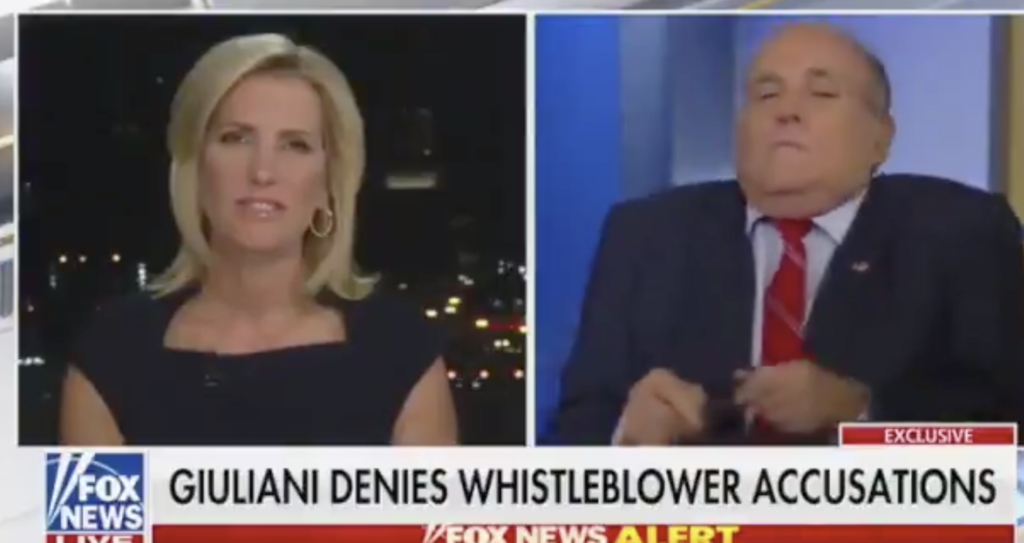Racism and Credit Claiming: A History of Rudy Giuliani

As Rudy Giuliani immolates what’s left of his reputation, this is a good piece reminding us that his reputation was never actually merited. He’s just a race-baiter who was very good at claiming credit for stuff he had little or nothing to do with:
Even at the time, careful observers questioned whether his reputation was built more on real accomplishment or flimflam. William Glaberson reported for the New York Times that “five months after Mr. Giuliani left the office, some of those who are best qualified to judge him say in interviews that not all of Mr. Giuliani’s accomplishments were as impressive as his press clippings suggested and that his successes stemmed partly from extensive work by others and a healthy dose of luck.” Many of his biggest wins largely involved taking credit for the work of others (the Securities and Exchange Commission, the State Organized Crime Task Force), and some of his biggest prosecutions fell apart.
[…]
Looking back in retrospect at the miraculous New York City turnaround, what’s striking is how little there really was to it. It was David Gunn’s six-year run as the head of the New York City Transit Authority from 1984 to 1990 that cured the subway of its graffiti problemand restored reliability to service. The city’s population, similarly, had already started growing again by 1990. And crime, Giuliani’s signature issue, began to fall before he took office.
What’s more, we know now that murder rates started to fall in virtually all major American cities in the 1990s. In retrospect, some analysts credit the natural waning of the 1980s crack epidemic and the delayed benefits of the switch to unleaded gasoline. A Clinton administration initiative to fund hiring of more police officers also seems to have helped.
[…]
Like Trump, Giuliani appeared to be deliberately courting accusations of racism as a way to position himself as the true champion of the city’s white majority.
In 1994 when veteran Rep. Charlie Rangel called on the mayor to do more outreach to black elected officials, Giuliani retorted that “they’re going to have to learn how to discipline themselves in the way in which they speak also.” That in turn prompted a scolding from Adam Clayton Powell Jr. and helped entrench perceptions in liberal intellectual circles (like my parents and most of their friends) that Giuliani was a racist, and perceptions in working-class white circles that Giuliani was the victim of political correctness.
Early in his term, officers charged aggressively into a Harlem mosque based on a fake 9-1-1 call setting off a brawl that led to the injury of eight officers. Giuliani quickly positioned himself as the anti-Dinkins, insisting their was nothing wrong with the police officers’ response, even though they’d clearly failed to follow departmental guidelines about dealing with places of worship, and insisted “the only real issue was the assault on police officers.” Days later, the unarmed 17-year-old son of a prominent Brooklyn imam was shot after an arrest on drug possession charges and Giuliani again simply backed the protesters.
[…]
Giuliani had at this time been making headlines by picking weird fights about art with the Brooklyn Museum and seemed to have largely exhausted his policy agenda. People wanted some effort at mending fences between police and the black community, but Giuliani wasn’t going to touch that topic. And he seemed to have relatively little interest in education, transportation, and the other main elements of municipal government.
Then came the September 11 terrorist attacks, a confusing and frightening time for virtually everyone and a perfect backdrop for Giuliani’s showmanship. Giuliani did not particularly do anything noteworthy on the day in question, and in retrospect his administration’s earlier decision to house the city’s emergency command center at 7 World Trade Center (which was destroyed in the attack) was a tragic error. But he offered a kind of commanding on-the-ground presence and his leadership was reassuring to many moderate New Yorkers who’d voted for him but never in a million years would have backed George W. Bush for president.
Acting as a spectacularly ineffective surrogate for his fellow New York City blustering racist seems like the perfect career ending our underachieving elites so rarely receive.


